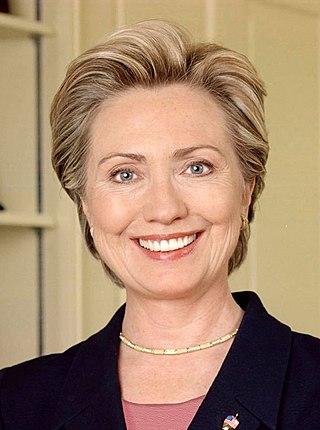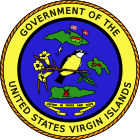
Each of the 50 U.S. states, the District of Columbia, and territories of the United States holds either primary elections or caucuses to help nominate individual candidates for president of the United States. This process is designed to choose the candidates that will represent their political parties in the general election.

The 2008 Iowa Democratic presidential caucus occurred on January 3, and was the state caucuses of the Iowa Democratic Party. It was the first election for the Democrats of the 2008 presidential election. Also referred to as "the First in the Nation Caucus," it was the first election of the primary season on both the Democratic and Republican sides. Of the eight major Democratic presidential candidates, then-U.S. Senator Barack Obama of Illinois received the most votes and was ultimately declared the winner of the Iowa Democratic Caucus of 2008, making him the first African American to win the caucus and the first African American to win a primary state since Jesse Jackson in 1988. Former U.S. Senator John Edwards of North Carolina came in second place and then-U.S. Senator Hillary Clinton of New York finished third, though Clinton received more delegates than Edwards. Campaigning had begun as early as two years before the event.
The results of the 2008 Democratic Party presidential primaries are the detailed outcomes of a series of contests by which members of the United States Democratic Party chose their candidate for the 2008 U.S. presidential election. The contests are held in each of the fifty U.S. states, as well as the District of Columbia, Puerto Rico, American Samoa, Guam, the U.S. Virgin Islands, and Democrats Abroad. The Northern Mariana Islands was the lone U.S. state or territory which did not have a primary or caucus election in 2008. The outcomes include totals of delegates selected as well as popular votes.

The 2008 Louisiana Republican presidential caucuses were held on January 22 and the primary on February 9, 2008.

The 2008 Idaho Democratic presidential caucuses were held on Super Tuesday, February 5, 2008, with 18 national delegates at stake. For the first time, caucuses were held in all 44 counties, all of them open caucuses organized at the county level rather than the precinct level.

The 2008 North Dakota Democratic presidential caucuses took place on February 5, 2008, one of the many Super Tuesday nominating contests held that day. Barack Obama won the caucuses, securing 8 out of 13 national delegates.
The 2008 U.S. Virgin Islands Republican territorial meeting, also known as the Republican caucuses, took place on the U.S. Virgin Islands of St. Croix and St. Thomas on April 5, 2008. Virgin Islands Republicans could select six pledged delegates for the 2008 Republican National Convention; three party leaders also attended the convention as unpledged delegates. However, the delegates chosen in the meeting did not support any presidential candidate, so all nine Virgin Islands delegates attended the convention as unpledged delegates.

Voters of the Republican Party elected state delegations to the 2012 Republican National Convention in presidential primaries. The national convention then selected its nominee to run for President of the United States in the 2012 presidential election. There were 2,286 delegates chosen, and a candidate needed to accumulate 1,144 delegate votes at the convention to win the nomination. The caucuses allocated delegates to the respective state delegations to the national convention, but the actual election of the delegates were, many times, at a later date. Delegates were elected in different ways that vary from state to state. They could be elected at local conventions, selected from slates submitted by the candidates, selected at committee meetings, or elected directly at the caucuses and primaries.

From January 3 to June 5, 2012, voters of the Democratic Party chose its nominee for president in the 2012 United States presidential election. President Barack Obama won the Democratic Party nomination by securing more than the required 2,383 delegates on April 3, 2012, after a series of primary elections and caucuses. He was formally nominated by the 2012 Democratic National Convention on September 5, 2012, in Charlotte, North Carolina.

Presidential primaries and caucuses of the Republican Party took place within all 50 U.S. states, the District of Columbia, and five U.S. territories between February 1 and June 7, 2016. These elections selected the 2,472 delegates that were sent to the Republican National Convention. Businessman and reality television personality Donald Trump won the Republican nomination for president of the United States.

This article contains the results of the 2016 Republican presidential primaries and caucuses, the processes by which the Republican Party selected delegates to attend the 2016 Republican National Convention from July 18–21. The series of primaries, caucuses, and state conventions culminated in the national convention, where the delegates cast their votes to formally select a candidate. A simple majority (1,237) of the total delegate votes (2,472) was required to become the party's nominee and was achieved by the nominee, businessman Donald Trump of New York.
The Northern Mariana Islands did not participate in the November 8, 2016 general election for President of the United States, because it is a territory and not a state. However, the five non-incorporated territories that send delegates to the House of Representatives participated in the presidential primaries of both major parties.

The 2016 U.S. Virgin Islands Democratic presidential caucuses were held on June 4 in the U.S. territory of the United States Virgin Islands as one of the Democratic Party's primaries ahead of the 2016 presidential election.
The 2016 U.S. Virgin Islands Republican presidential caucuses took place on March 10 in the U.S. territory of the United States Virgin Islands as one of the Republican Party's primaries ahead of the 2016 presidential election.

The 2020 Nevada Democratic presidential caucuses took place on February 22, 2020, with early voting on February 14–18, and was the third nominating contest in the Democratic Party primaries for the 2020 presidential election, following the New Hampshire primary the week before. The Nevada caucuses were a closed caucus, meaning that only registered Democrats could vote in this caucus. The state awarded 49 delegates towards the national convention, of which 36 were pledged delegates allocated on the basis of the results of the caucuses.

The 2020 Rhode Island Democratic presidential primary took place on June 2, 2020, after being postponed due to concerns about the coronavirus pandemic, as one of eight delayed and regular primaries on the same day in the Democratic Party primaries for the 2020 presidential election. It was originally planned to take place on April 28, 2020, as one of several northeastern states in the "Acela primary". The Rhode Island primary was a semi-closed primary, with the state awarding 35 delegates, of whom 26 were pledged delegates allocated on the basis of the primary results.

Although American Samoa did not participate in the 2020 presidential election because it is a U.S. territory and not a state, it still participated in the U.S. presidential primaries and caucuses. Former mayor Michael Bloomberg won the Democratic caucus, held on March 3. The Republican caucus, in the form of a territorial convention held on March 18, endorsed incumbent President Donald Trump.

Although the Northern Mariana Islands did not participate in the 2020 presidential election because it is a U.S. territory and not a state, it still participated in the U.S. presidential primaries and caucuses. Senator Bernie Sanders won the Democratic caucus, held on March 14, which would be his last win in the 2020 primary season. The Republican caucus, held on March 15 during the party's commonwealth convention, unanimously voted for incumbent President Donald Trump.

Although the United States Virgin Islands did not participate in the 2020 presidential election because it is a U.S. territory and not a state, it still participated in the U.S. presidential caucuses and primaries. Former vice president Joe Biden won the Democratic caucuses, held on June 6. The Republican caucuses, held on March 14 in the form of a territorial convention, voted for incumbent president Donald Trump.
"Uncommitted" is a voting option in some United States presidential primaries. This option is listed along with the names of individuals running for the position and is often described as "none of the above". Depending on state and party thresholds, voting uncommitted may allow states to send uncommitted delegates to a party's nominating convention.















